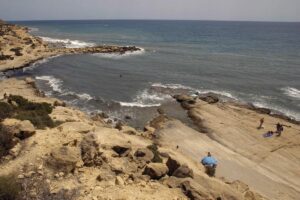A recent scientific expedition has raised a new alarm signal about the state of the Mediterranean Sea. The Calypso Trench, located between Greece and the coast of Africa and considered the deepest point in the Mediterranean at over 5,100 meters, has ceased to be a remote and inaccessible enclave, as it is also contaminated. An international team of scientists, including several Spaniards, managed to explore this marine depression aboard the submersible Limiting Factor, documenting the presence of 167 pieces of trash in just 43 minutes of immersion.
Among the waste found are plastics, glass, metals, and even partially buried papers. One of the most disturbing findings was the linear arrangement of several objects, which could indicate deliberate dumping from ships. “We have found evidence of the deliberate throwing of garbage bags from ships, as evidenced by the accumulation of waste in a straight line,” explained Miquel Canals, a professor at the University of Barcelona and one of the participants in the mission.
The research, whose results were published in the journal Marine Pollution Bulletin, describes how the morphology of the Calypso Trench makes it a geological trap for waste. It is a closed environment, with little water circulation—barely two centimeters per second—which facilitates the deposition and permanence of garbage on the seabed.
According to Canals, the trench “acts as a marine vacuum cleaner,” trapping the waste that arrives due to currents or is directly thrown from ships. This accumulation is particularly dangerous due to the degradation of plastics into microplastics, particles that can integrate into sediments or be ingested by marine species.
During the immersion, scientists observed species such as Coryphaenoides mediterraneus and Acanthephyra eximia, typical of deep waters. Although it is a limited biodiversity, the impacts of pollution can be severe and long-lasting. Similar studies have shown that exposure to plastics can cause physiological and reproductive damage to abyssal fauna.

No corner of the Mediterranean is safe
The origin of the waste is varied. Some come from the mainland dragged by ocean currents, while others come directly from activity on the high seas. “We have found plastic bags partially buried that probably came from the coast and were dragged along the seabed until accumulating here,” Canals pointed out.
Although the trench is over 60 kilometers from the nearest coast, its pollution shows that no point in the sea is truly protected. “Unfortunately, regarding the Mediterranean, it would not be an exaggeration to say that not a single centimeter is free of garbage,” the researcher concluded.
The discovery in Calypso adds a new warning about the impact of human activity on the oceans. An environment that was believed to be isolated and preserved now emerges as another testimony of an environmental crisis that does not recognize depths.

The Calypso Trench, an aquatic trap
The Calypso Trench is a geological depression in the Ionian Sea, off the coast of Greece, which houses the deepest point in the Mediterranean, with the following characteristics:
- Location: It is located in the Hellenic Trench, an area of high seismicity, situated about 60 kilometers west of the Peloponnese coast and 62.6 km southwest of Pylos, Greece.
- Depth: Its maximum depth is approximately 5200 m (17,100 feet).
- Shape: It has a kidney-shaped form of approximately 20 by 5 kilometers.
- Geological characteristics: It is a geological trap for trash. Its closed structure and low water circulation prevent materials from dispersing.
- Pollution: The bottom of the trench hosts one of the highest concentrations of marine debris in the deep ocean. The waste includes plastics, glass, metal, and paper.
Source: El Confidencial.
Do you already know our YouTube channel? Subscribe!

